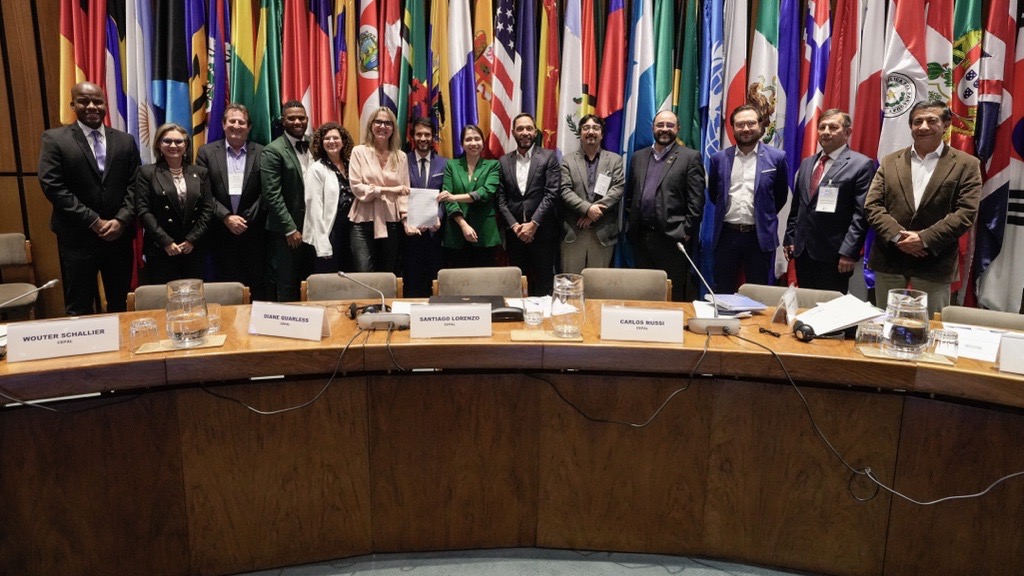Parliamentarians Commit to Building a Regional Agenda for Climate Ambition and a Just Transition
Work area(s)
Topic(s)
The first Parliamentary Summit on Climate Change and Just Transition in Latin America and the Caribbean took place today at ECLAC.

Legislators from Latin America and the Caribbean committed themselves today to building a concrete regional agenda for climate ambition and a just transition, during the first Parliamentary Summit on Climate Change and Just Transition in Latin America and the Caribbean, which was held at the headquarters of the Economic Commission for Latin America and the Caribbean (ECLAC) in Santiago, Chile.
The event, which took place in the framework of the first in-person meeting of the Parliamentary Observatory on Climate Change and Just Transition (OPCC), was attended by OPCC parliamentary participants from Argentina, Brazil, the British Virgin Islands, Chile, Colombia, Costa Rica, Curaçao, Ecuador, Mexico, Panama, Paraguay and Uruguay.
In a Joint Statement, the legislators agreed to promote actions linked to ecosystem conservation; the financing framework and green and sustainable taxonomy; budgeting for sustainability; and sustainable and climate-resilient development and green industrialization towards a new economic model.
With regard to ecosystem conservation, the parliamentarians committed themselves (among other points) to driving initiatives for the protection, conservation and restoration of ecosystems, pursuing the imperative of expanding the surface area of protected natural areas in line with the “30x30” target of the United Nations Convention on Biological Diversity, while also promoting the creation of ecological corridors and other areas for the conservation of species, providing them with legal security through specific regulations.
With regard to the financing framework and green and sustainable taxonomy, they agreed to establish a financing framework that promotes investments that not only mitigate climate change but also foster climate resilience, promote adaptation and are linked to loss and damage, by providing financial support to investments in public infrastructure, premises and green communities.
In the area of budgeting for sustainability, meanwhile, the authorities stressed the importance of public spending in the just transition to sustainable, low-carbon economies, and also committed to setting a common and high standard for publicly funded projects and actions that addresses the need to ensure that all public spending and investment be sustainable.
Finally, with regard to sustainable and climate-resilient development and green industrialization, the parliamentarians emphasized that the transition to a low-carbon and sustainable economy must be the central focus and inseparable element of a country's development strategy, at the heart of which must be the objective of ensuring human rights, human dignity and promoting the well-being of the people of our region in all their diversity.
“Based on our role in the different parliaments of Latin America and the Caribbean, we commit to promoting regulations to accelerate the just and sustainable energy transition and promote strategic sectors, in order to build a new economic model that supports a healthy environment, human life in its diversity and sustainable development,” the legislators affirmed in their Statement.
Furthermore, they agreed to identify – through a process of dialogue between parliamentarians participating in the OPCC and within the framework of existing regional integration processes, such as the Southern Common Market (MERCOSUR), the Andean Community (CAN) and the Caribbean Community (CARICOM) – common mechanisms for measuring, compensating and reducing the impacts of manufacturing, agriculture and tourism activities, and for the agile and transparent implementation of payment mechanisms for ecosystem services.
“We urge parliamentarians around the world to join our efforts in this initiative, through inter-parliamentary cooperation and alliance for the common goals and challenges we have as parliamentarians of the Global South,” the Statement concludes.
The Parliamentary Observatory on Climate Change and Just Transition (OPCC) is an initiative carried out jointly by parliamentary leaders from various countries in Latin America and the Caribbean. It aims to serve as a shared information tool on the state of environmental legislation and parliamentary treatment in the region.